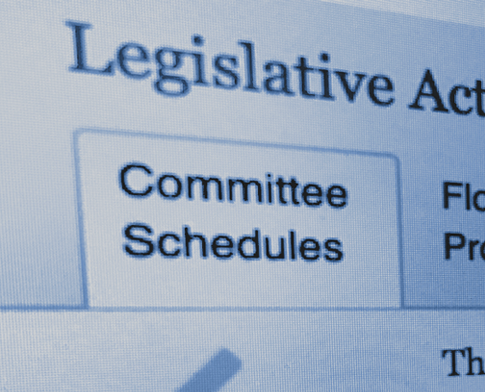Health Update (December 22)
As the impeachment proceedings wrapped up in the House, Congress passed a $1.4 trillion spending package that includes funding for the government through FY 2020 and extended funding for health extenders until May 22, 2020. This week, taxes that were passed to fund major parts of the Affordable Care Act (ACA) also were at the forefront of major policy decisions. Congress included a full repeal of the health insurance tax (HIT), medical device tax, and the Cadillac tax as part of the spending bill. Also, the Fifth Circuit Court of Appeals on Wednesday (Dec. 18) struck down the Affordable Care Act’s (ACA) individual mandate. In other news, the administration proposed a rule allowing states to import certain drugs from Canada and a draft guidance letting drug makers import their own drugs intended for distribution abroad, the Senate Judiciary Committee held a contentious hearing on the opioid crisis, and a key provision protecting market exclusivity for biologic drugs in the USMCA was dropped.
ACA
A federal appeals court on Wednesday (Dec. 18) struck down the Affordable Care Act’s (ACA) individual mandate in a decision that immediately thrusts the health care law to the forefront of the 2020 elections. However, the appeals court ruling largely ducked the central question of whether the rest of the ACA remained valid after Congress removed the penalty for not having health insurance. The three-judge panel instead sent the case back to a Texas federal judge, who previously threw out the entire law, to reconsider how much of the ACA could survive. The lawsuit against the ACA was brought by more than a dozen states that argued the law is no longer constitutional after Congress jettisoned the individual mandate penalty in the Tax Cuts and Jobs Act of 2017 (TCJA). The mandate was originally upheld by the Supreme Court seven years ago as a legitimate use of congressional taxing power — and without that penalty, the states argued the entire law should fall. The 5th Circuit Court of Appeals said its decision to send the case back to District Court Judge Reed O’Connor was largely precipitated by the Trump administration switching legal positions in the case earlier this year. The appeals court was silent on whether it thought the law’s insurance protections should be struck down. The decision, issued hours after the latest ACA enrollment season ended, does not interrupt coverage for anyone covered through ACA’s insurance marketplaces or Medicaid expansion. [1]
Spending Deal
Three ACA Taxes Repealed
The spending deal passed by Congress on Friday (Dec. 20) included the repeal of three ACA taxes. One of the rolled back measures, dubbed the “Cadillac tax,” is a 40% excise tax on high-cost employer plans that has never taken effect. Full repeal comes with a hefty $200 billion price tag. House lawmakers passed it without any way to pay for it. The House voted to repeal the tax in July. More than 1,000 employers, insurers, unions, and other organizations in early December urged Senate leaders to scrap the Cadillac tax, which was set to go into effect in 2022. Lawmakers also repealed a health insurance tax beginning in 2021, as well as a full repeal of the ACA’s 2.3% excise tax on the sale of medical devices. [2]
CREATES Act
Congress included the CREATES Act to help pay for five months of Medicare and Medicaid “extenders” in the government funding bill. The timing of the extenders is designed to give Congress another chance to pass legislation to curb drug prices and end surprise hospital bills before Memorial Day. The Creating and Restoring Equal Access To Equivalent Samples (CREATES) Act aims to deter brand drug companies from blocking generic competition with post-market drug monitoring plans called Risk Evaluation and Mitigation Strategies (REMS). The bill lets generic drug makers sue brands for misusing REMS to withhold samples needed for FDA approvals. The Congressional Budget Office estimated that CREATES would decrease federal spending $3.7 billion over 10 years. [3]
Puerto Rico Funding
The budget deal also allocates up to $5.7 billion in Medicaid funds for Puerto Rico over two years. Puerto Rico’s Medicaid program has been relying on a series of short-term funding extensions since the fall, after confronting a fiscal cliff on Sept. 30 when a temporary boost in money — one of several that Congress has enacted in recent years — was set to expire. Its latest pool of funding expires Friday. The territory’s funding negotiations to secure a longer-term agreement for its Medicaid program, which covers roughly 1.4 million low-income people, have been particularly fraught after it experienced massive political upheaval and struggled to recover from hurricanes. In Congress, lawmakers have pushed stronger measures to prevent inappropriate spending by territory officials and monitor its contracting practices, after federal authorities earlier this year arrested a former top Puerto Rico health official and other territory leaders as part of a corruption probe. Puerto Rico’s fiscal 2020 budget includes more than $900 million in local funds to finance its Medicaid program, which has long been underfunded because of how federal law structures its payments. Unlike the Medicaid program in the 50 states — where the federal government and states share costs without strict limits on overall spending — federal funding for territories is capped. [4]
Canadian Drug Imports
The Trump administration on Wednesday (Dec. 18) moved forward on its plan to let states and drug makers import lower-cost prescription drugs from other countries. The administration proposed a rule allowing states to import certain drugs from Canada and a draft guidance letting drug makers import their own drugs intended for distribution abroad. The proposed rule applies to drugs that meet FDA labeling standards and impose no risk to health and safety. The import rule excludes controlled substances, biological products and intravenous drugs.[5] This would be the first time in history that the importation of drugs from a foreign country would be allowed in the United States. In addition, the administration is announcing the availability of a new draft guidance that outlines procedures drug manufacturers can use to facilitate importation of prescription drugs. This includes biological products that are FDA-approved, manufactured abroad, authorized for sale in any foreign country, and originally intended for sale in that foreign country. This also includes a 75-day comment period where FDA will review and publicize the final rule and permits sponsoring entities for approval plans for importation.
HHS announced that there would be two pathways moving forward:
Under Pathway 1, a Notice of Proposed Rulemaking (NPRM) would rely on the authority in the Federal Food, Drug, and Cosmetic Act (FD&C Act) Section 804 to authorize demonstration projects to allow importation of drugs from Canada. The NPRM would include conditions to ensure the importation poses no additional risk to the public’s health and safety and that it will achieve significant cost savings to the American consumer.
● The NPRM would propose that pharmacists submit applications to HHS demonstrating how they will comply with the statutory safety and cost conditions as well as additional requirements that would be imposed to approve a demonstration.
● The demonstrations would be time limited and require reporting and renewal and could be revoked if conditions are not met.
● Also included were additional safety requirements including tracking requirements, cost requirements, drug eligibility requirements, packaging requirements, testing procedures, and supply chain requirements.
Under Pathway 2, Manufacturers of FDA-approved drug products would be able to import versions of these FDA-approved drugs that they sell in foreign countries into the U.S. To use this pathway, the manufacturer or person authorized by the manufacturer would need to establish with FDA that the foreign version is the same as the U.S. version. If this condition is met, FDA would allow the drug to be labeled for sale in the U.S. and imported.
A notice of the Proposed Rulemaking can be found here.
A Draft Guidance of the plan can be found here.
An outline of the Safe Importation Action Plan can be found here.
USMCA
United States Trade Representative Robert Lighthizer dropped the pharmaceutical industry’s provision protecting market exclusivity for biologic drugs from the USMCA deal during a negotiation with House Democrats. As originally negotiated, the NAFTA replacement deal would have provided 10 years of market exclusivity for biologic drugs, a new class of medicines developed from living organic molecules, rather than chemicals, that are used to treat numerous serious and life-threatening diseases such as cancer. That would have provided the longest term of protection of any free trade agreement to date and two years more than Canada now provides. It would also have doubled Mexico’s five-year protection period and strengthen its enforcement, satisfying another demand of brand-name manufacturers. U.S. law provides 12 years of protection for biologics and industry saw the USMCA provision as a first step in developing a higher international standard for the protection of intellectual property associated with the life-saving drugs. [6]
CBO Score for May 22nd House Budget Committee Hearing
The Congressional Budget Office (CBO) published their answers to Questions for the Record (Q&Rs) from a House Budget Committee hearing on May 22nd, entitled “Key Design Components and Considerations for Establishing a Single-Payer Health Care System.”
A link to the answers can be found here.
References
[1] Demko, Paul. “Court voids Obamacare mandate – but not the whole law.” Politico Pro. 18 Dec. 2019. https://subscriber.politicopro.com/article/2019/12/appeals-court-throws-out-obamacares-individual-mandate-1613143
[2] Cohrs, Rachel. “Funding deal repeals ACA taxes, delays DSH cuts.” Modern Healthcare. 16 Dec. 2019. https://www.modernhealthcare.com/politics-policy/funding-deal-repeals-aca-taxes-delays-dsh-cuts
[3] Wilkerson, John. “CREATES Helps Pay for 5-Months of Extenders in Spending Deal.” Inside Health Policy. 16 Dec. 2019. https://insidehealthpolicy.com/inside-drug-pricing-daily-news/creates-helps-pay-5-months-extenders-spending-deal
[4] Pradhan, Rachana. “Trump slashed Puerto Rico’s Medicaid money as part of budget deal.” Politico Pro. 17 Dec. 2019. https://subscriber.politicopro.com/article/2019/12/trump-slashed-puerto-ricos-medicaid-money-as-part-of-budget-deal-1850954
[5] Cohen, Ariel. “Trump administration Moves Forward on Drug Importation Plan.” Inside Health Policy. 18 Dec. 2019. https://insidehealthpolicy.com/daily-news/trump-administration-moves-forward-drug-importation-plan
[6] Palmer, Doug. “Brand-name drugmakers fume after Trump reversal in USMCA deal.” Politico Pro. 18 Dec. 2019. https://subscriber.politicopro.com/article/2019/12/brand-name-drug-makers-fume-after-trump-reversal-in-usmca-deal-1851643
HOUSE.GOV
The Week Ahead
For the main events of the next week and more, go straight to the key events on the house.gov website.
SENATE.GOV
The Week Ahead
For the main events of the next week and more, go straight to the key events on the senate.gov website.


